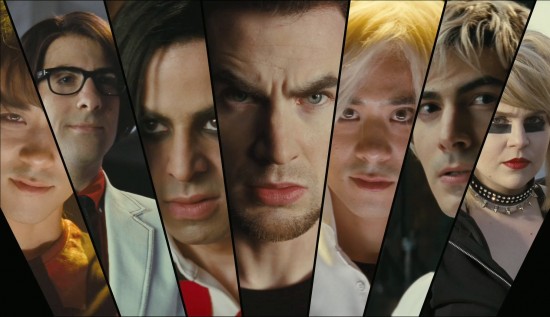Hey, look! It's Michael Cera starring in a film version of a graphic and/or young adult novel! What are the odds? Well, yes, quite good, actually. Roughly equal, it would seem, to finding Ellen Page in a coming of age film in recent years in which she plays the spunky protagonist. While Ms. Page has made perhaps not so much a great leap as a small step from her roles in Juno, Whip It, etc., to Christopher Nolan's dreamscaping extravanganza, Inception, the mild-mannered Mr. Cera is called upon to don the hoodie once more in Scott Pilgrim vs. The World. The good news in this case, as opposed to Cera's last such outing, the insufferable Youth in Revolt, is that he finds himself in the hands of Edgar Wright, the promising director of both Sean of the Dead and Hott Fuzz. Faint praise though it may be, but Scott Pilgrim vs. The World is easily one of the year's best comedies.
It seems wearily appropriate that "Scott Pilgrim" begins with its 22-year-old (Cera's actual age) title character announcing that he's won the affection of high schooler Knives Chau (I don't make up these cutesy graphic novel character names, I merely report them) to his friends and bandmates. Mr. Cera seems to happily work his limited aresenal of wide-eyed expressions and halting speech throughout "Scott Pilgrim." But he might want to think about putting away childish acting things before that bankable cuteness is painfully no longer evident.
Fortunately, where Cera is something of a vacuum at the center Scott Pilgrim vs. the World, almost everything and everyone around him is great. This might just be the best film adaptation of a graphic novel yet, taking the outlandish story and it's framing and super-powering it with all the technology now available to filmmakers. This story doesn't have the substance of Ghost World, but it's certainly got style to spare. More recently, Youth in Revolt's occasional lapses into animation seemed haphazard and desperate by comparison to all the inspired realization by Egar Wright, real and animated, of the series of grahic novels by Bryan Lee O'Malley.
Not long into his courtship with young Knives, Scott's head is turned by a punky American who rollerblades into his heart while making a delivery to the high school library. This the older Ramona Flowers (Mary Elizabeth Winstead), who has moved to Toronto from NYC, to make a new start and, as Scott is to find out too late, escape her League of Seven Evil Exes.
Perhaps funniest of the evil exes is No. 3 - and lest one lose count, he wears a shirt with racing stripes a big number 3 on the chest - who is imbued with "special vegan powers." Both number three and the vegan cops who ultimately bust him (he used half and half in his coffee, believing it to be soy milk) are not exactly your stereotypical vegans, but instead are the sort of buff, high-fiving dudes who one can more readily imagine pounding Red Bull or devouring a chilupa at Taco Bell.
The last of the evil exes turns out to be the executive who Sex Bob-omb have been pursuing for a record deal, Gideon Graves (Jason Schwartzman). Gideon, we find out, originated the league of evil exes. There's a slightly dire symmetry to their battle occuring at story's end. As "Scott Pilgrim" begins with its hero cavorting with a high school girl, it culminates with Cera essentially facing the ghost of his career future. Mr. Schwartzman is another one-and-a-half-note artist, who made a great splash as a teenager (Rushmore) and has yet to make a convicing transition to an adult actor. Perhaps we should all be so unsuccessful; like Cera, he seems to be doing alright for himself playing basically the same manchild over and over. None-the less, tick tock, gentlemen, tick tock.
 |
| The League of Seven Evil Exes |
As with all the battles between Scott and the exes, there's little suspense as to who will prevail. The fun lies in how the ass-kicking will play out. Like his main character in Scott Pilgrim vs. The World, director Edgar Wright seems able to master anything that comes his way.
db




Comments
Post a Comment